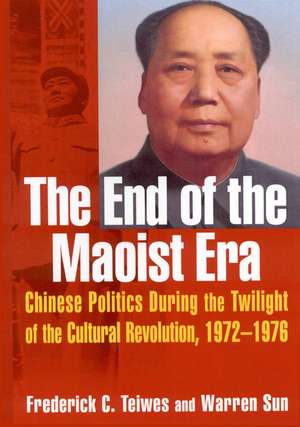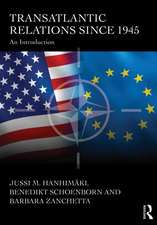The End of the Maoist Era: Chinese Politics During the Twilight of the Cultural Revolution, 1972-1976: Chinese Politics During the Twilight of the Cultural Revolution, 1972-1976
Autor Frederick C Teiwes, Warren Sunen Limba Engleză Paperback – iul 2008
| Toate formatele și edițiile | Preț | Express |
|---|---|---|
| Paperback (1) | 470.64 lei 6-8 săpt. | |
| Taylor & Francis – iul 2008 | 470.64 lei 6-8 săpt. | |
| Hardback (1) | 1295.45 lei 6-8 săpt. | |
| Taylor & Francis – 15 feb 2007 | 1295.45 lei 6-8 săpt. |
Preț: 470.64 lei
Nou
Puncte Express: 706
Preț estimativ în valută:
90.06€ • 96.30$ • 75.09£
90.06€ • 96.30$ • 75.09£
Carte tipărită la comandă
Livrare economică 17 aprilie-01 mai
Preluare comenzi: 021 569.72.76
Specificații
ISBN-13: 9780765610973
ISBN-10: 0765610973
Pagini: 729
Dimensiuni: 152 x 229 x 38 mm
Greutate: 0.95 kg
Ediția:1
Editura: Taylor & Francis
Colecția Routledge
Locul publicării:Oxford, United Kingdom
ISBN-10: 0765610973
Pagini: 729
Dimensiuni: 152 x 229 x 38 mm
Greutate: 0.95 kg
Ediția:1
Editura: Taylor & Francis
Colecția Routledge
Locul publicării:Oxford, United Kingdom
Cuprins
Introduction; Chapter 1 Coming to Terms With Lin Biao: “Ultra-Left” and “Ultra-Right” on the Road to the Tenth Party Congress, 1972–73; Chapter 2 “The Second Cultural Revolution,” Fall 1973-Summer 1974; Chapter 3 Toward the Fourth National People’s Congress, August 1974–January 1975; Chapter 4 Mao, Deng and the Politics of Consolidation: From the Fourth Npc to Summer 1975; Chapter 5 Deng’s Period “in Charge”: Comprehensive Consolidation, July–October 1975; Chapter 6 The Unfolding of a New Leadership Equation: The Turn Against Deng and the Ascent of Hua, November 1975-March 1976; Chapter 7 The Tiananmen Incident and Mao’s Last Days, April-September 1976; Chapter 8 The Purge of the “Gang of Four,” September-October 1976; concl Conclusion;
Notă biografică
Frederick C. Teiwes is Emeritus Professor of Chinese Politics at the University of Sydney. He received his B.A. from Amherst College and his Ph.D. in political science from Columbia University, and subsequently taught and conducted research at Cornell University and the Australian National University before joining the University of Sydney in 1976. He is the author of various books on Chinese elite politics including Politics and Purges in China (1979, 1993), Leadership, Legitimacy, and Conflict in China (1984), and Politics at Mao’s Court (1990).,
Warren Sun is Senior Lecturer in the Chinese Studies Department at Monash University, which he joined in 1996 after a decade as Senior Research Fellow at University of Sydney. Originally from Taiwan, he received his B.A. in English Literature from Taiwan National University and his Ph.D. in modern Chinese intellectual history from the Australian National University. Apart from ongoing work on Chinese Communist Party history, he has published on the life and works of Zhang Binglin, the last master of classical Chinese learning. Until recently he was head of the Chinese Studies Department at Monash.Over the past decade and a half Professor Teiwes and Dr Sun have jointly produced numerous publications including The Politics of Agricultural Cooperativization in China: Mao, Deng Zihui, and the “High Tide” of 1955 (1993), The Tragedy of Lin Biao: Riding the Tiger during the Cultural Revolution, 1966–1971 (1996), and China’s Road to Disaster: Mao, Central Politicians and Provincial Leaders in the Emergence of the Great Leap Forward, 1955–1959 (1999).
Warren Sun is Senior Lecturer in the Chinese Studies Department at Monash University, which he joined in 1996 after a decade as Senior Research Fellow at University of Sydney. Originally from Taiwan, he received his B.A. in English Literature from Taiwan National University and his Ph.D. in modern Chinese intellectual history from the Australian National University. Apart from ongoing work on Chinese Communist Party history, he has published on the life and works of Zhang Binglin, the last master of classical Chinese learning. Until recently he was head of the Chinese Studies Department at Monash.Over the past decade and a half Professor Teiwes and Dr Sun have jointly produced numerous publications including The Politics of Agricultural Cooperativization in China: Mao, Deng Zihui, and the “High Tide” of 1955 (1993), The Tragedy of Lin Biao: Riding the Tiger during the Cultural Revolution, 1966–1971 (1996), and China’s Road to Disaster: Mao, Central Politicians and Provincial Leaders in the Emergence of the Great Leap Forward, 1955–1959 (1999).
Descriere
Offering a different interpretation of the evolution of Chinese politics during the years 1972-82, this book provides a study of the end of the Maoist era, demonstrating Mao's dominance even as his ability to control events ebbed away. It analyzes the tensions within the "gang of four," the role of younger radicals, and more.











